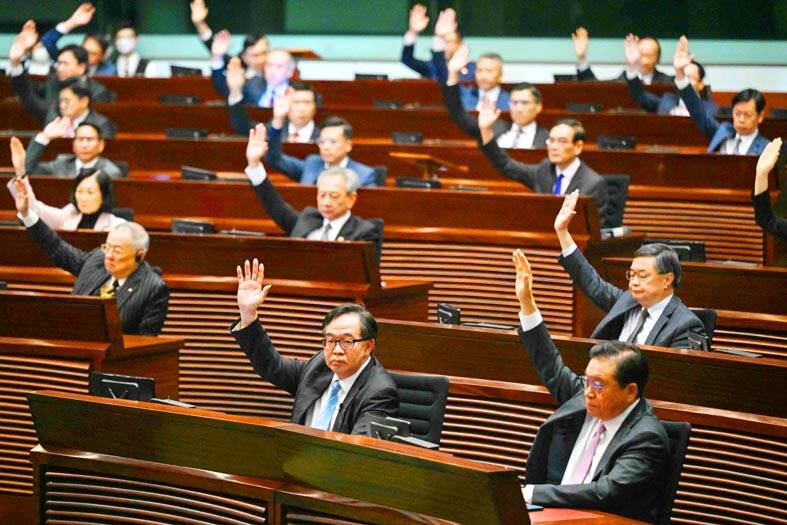China yesterday blasted critics of Hong Kong’s new national security law, after Western powers and the UN said it would further curtail freedoms in the territory.
Hong Kong’s Legislative Council on Tuesday passed the law unanimously, introducing tough new penalties for five categories of crimes including treason and theft of state secrets.
Commonly referred to as Article 23, the homegrown security law is to work in tandem with a 2020 Beijing-imposed version that has silenced nearly all dissent in the territory and led to nearly 300 people being arrested since its enactment.

Photo: AFP
Western nations including the US and the UK were swift to criticize the new law, with British Secretary of State for Foreign, Commonwealth and Development Affairs David Cameron saying it would “further damage the rights and freedoms enjoyed in the city” and calling the legislation “rushed.”
Chinese Ministry of Foreign Affairs spokesman Lin Jian (林劍) told reporters that “attacks and smears” against the new Hong Kong law by other governments and outside groups were “doomed to fail.”
“Security is a prerequisite for development, and the rule of law is the cornerstone of prosperity,” Lin said.
The law, which punishes treason, insurrection, theft of state secrets and espionage, sabotage, and external interference, is to plug “gaps” left by Beijing’s legislation, Hong Kong Chief Executive John Lee (李家超) said.
The government has said that its creation was a “constitutional responsibility.”
However, Cameron said the fast-tracked legislation undermined the 1984 Sino-British Joint Declaration, the internationally binding agreement that underlies the “one country, two systems” principle.
“I urge the Hong Kong authorities to ... uphold its high degree of autonomy and the rule of law, and act in accordance with its international commitments and legal obligations,” he said.
US Department of State spokesman Vedant Patel said that the US was “alarmed by the sweeping and what we interpret as vaguely defined provisions” in the law.
UN High Commissioner for Human Rights Volker Turk called the law and its “rushed” adoption “a regressive step for the protection of human rights.”

STILL COMMITTED: The US opposes any forced change to the ‘status quo’ in the Strait, but also does not seek conflict, US Secretary of State Marco Rubio said US President Donald Trump’s administration released US$5.3 billion in previously frozen foreign aid, including US$870 million in security exemptions for programs in Taiwan, a list of exemptions reviewed by Reuters showed. Trump ordered a 90-day pause on foreign aid shortly after taking office on Jan. 20, halting funding for everything from programs that fight starvation and deadly diseases to providing shelters for millions of displaced people across the globe. US Secretary of State Marco Rubio, who has said that all foreign assistance must align with Trump’s “America First” priorities, issued waivers late last month on military aid to Israel and Egypt, the

France’s nuclear-powered aircraft carrier and accompanying warships were in the Philippines yesterday after holding combat drills with Philippine forces in the disputed South China Sea in a show of firepower that would likely antagonize China. The Charles de Gaulle on Friday docked at Subic Bay, a former US naval base northwest of Manila, for a break after more than two months of deployment in the Indo-Pacific region. The French carrier engaged with security allies for contingency readiness and to promote regional security, including with Philippine forces, navy ships and fighter jets. They held anti-submarine warfare drills and aerial combat training on Friday in

COMBAT READINESS: The military is reviewing weaponry, personnel resources, and mobilization and recovery forces to adjust defense strategies, the defense minister said The military has released a photograph of Minister of National Defense Wellington Koo (顧立雄) appearing to sit beside a US general during the annual Han Kuang military exercises on Friday last week in a historic first. In the photo, Koo, who was presiding over the drills with high-level officers, appears to be sitting next to US Marine Corps Major General Jay Bargeron, the director of strategic planning and policy of the US Indo-Pacific Command, although only Bargeron’s name tag is visible in the seat as “J5 Maj General.” It is the first time the military has released a photo of an active

CHANGE OF MIND: The Chinese crew at first showed a willingness to cooperate, but later regretted that when the ship arrived at the port and refused to enter Togolese Republic-registered Chinese freighter Hong Tai (宏泰號) and its crew have been detained on suspicion of deliberately damaging a submarine cable connecting Taiwan proper and Penghu County, the Coast Guard Administration said in a statement yesterday. The case would be subject to a “national security-level investigation” by the Tainan District Prosecutors’ Office, it added. The administration said that it had been monitoring the ship since 7:10pm on Saturday when it appeared to be loitering in waters about 6 nautical miles (11km) northwest of Tainan’s Chiang Chun Fishing Port, adding that the ship’s location was about 0.5 nautical miles north of the No.